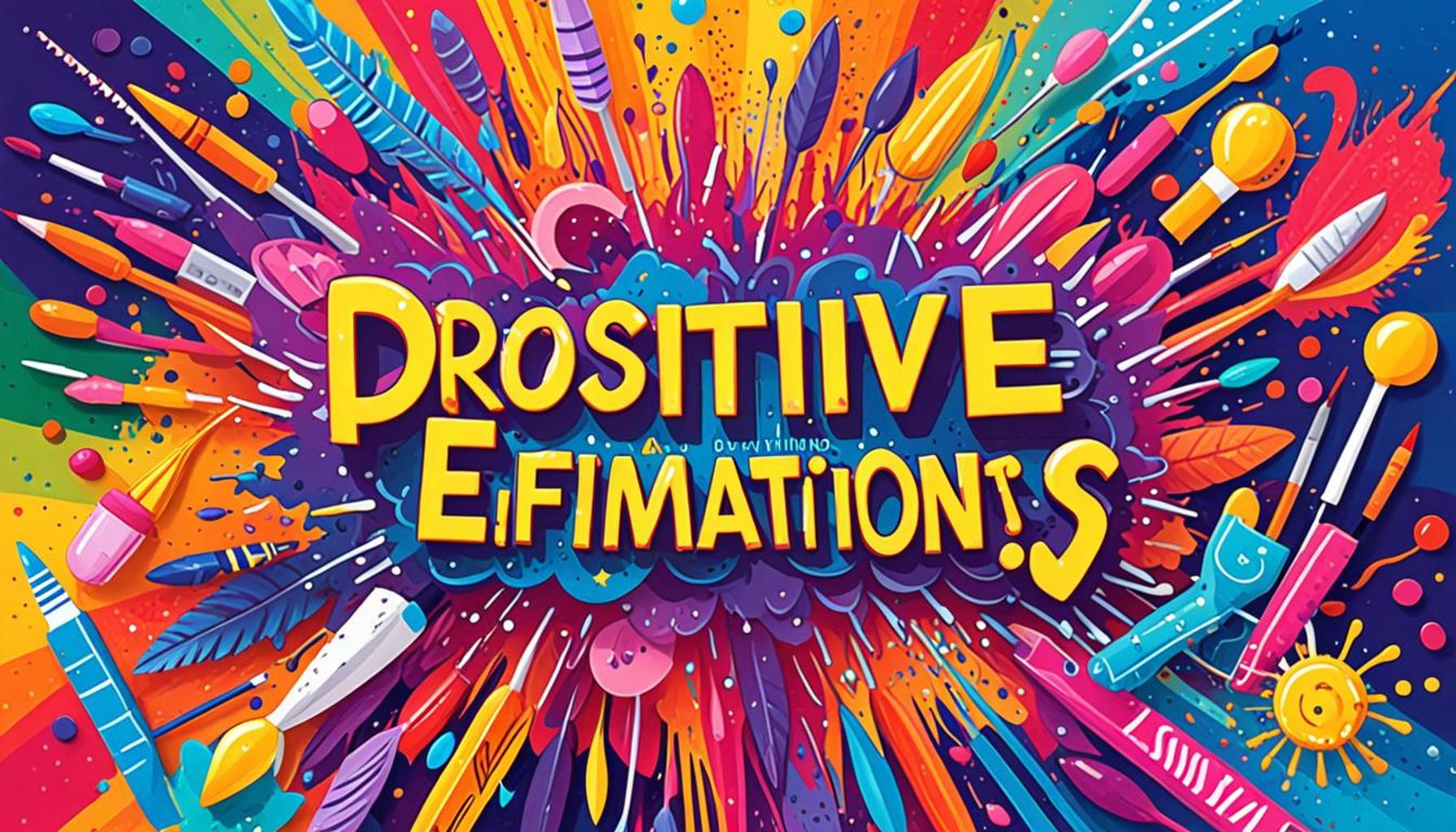Positive Affirmations and the Art of Cultivating Healthy Relationships: Strengthening Empathy and Understanding

The Power of Positive Affirmations
In contemporary society, where pressures and demands can often lead to misunderstandings and rifts, the value of nurturing healthy connections becomes paramount. To address these challenges effectively, the implementation of positive affirmations emerges as a transformative approach. This practice not only aims to enhance individual mindsets but also fosters stronger bonds within communities, making it essential in settings like Nigeria, where relationships play a crucial role in social structure.
The Mechanics of Positive Affirmations
Positive affirmations are declarative statements designed to cultivate a positive self-perception and outlook on life. By repeating these statements, individuals can impact their subconscious minds, fostering a newfound sense of confidence and resilience. For instance, affirmations such as “I am worthy of love and respect” or “I can create meaningful relationships” serve as a reminder of one’s value, allowing individuals to approach interpersonal interactions with renewed strength.
Key Benefits of Practicing Positive Affirmations
- Builds Confidence: Regular use of affirmations can enhance self-esteem, which is fundamental in enabling individuals to engage with others more openly. For example, a young adult in Nigeria who feels uncertain about their place in a competitive job market might utilize affirmations daily, bolstering their confidence when networking or interviewing.
- Enhances Empathy: Engaging with positivity helps us better understand and connect with the feelings of others. This shift can prove significant in Nigerian communities. When individuals practice empathy, they are more likely to listen actively and respond thoughtfully, thereby preventing conflicts that are rooted in miscommunication.
- Strengthens Communication: Affirmative language encourages open dialogue. When people express themselves using uplifting phrases, it creates a more welcoming environment for conversation, making it easier to discuss complex topics important to community life, such as local governance or social issues.
A Cultural Application in Nigeria
In Nigeria, where communal living and connectivity are woven into the fabric of society, the adoption of positive affirmations can serve as a remedy for societal rifts. In family settings, for instance, a simple affirmation like “We support one another through life’s challenges” can help resolve conflicts rooted in misunderstandings. Furthermore, in romantic relationships, expressing affirmations such as “You bring joy to my life” can enhance mutual appreciation and solidify trust.
Ultimately, the consistent practice of positive affirmations has the potential to transform not only personal relationships but also the broader community, promoting a culture of empathy and understanding. By integrating such practices into everyday interactions, individuals can contribute to the creation of a compassionate environment in Nigeria, one affirmation at a time.
CHECK OUT: Click here to explore more
Embracing Positive Affirmations for Relational Growth
In the journey towards nurturing healthy relationships, understanding the role of positive affirmations becomes crucial. These simple yet powerful statements help individuals reshape their thoughts and behaviors, ultimately benefiting their interactions with others. In Nigeria, a nation rich in culture and community ties, infusing daily life with positive affirmations about relationships can create a ripple effect, enhancing both personal and communal bonds.
The Role of Self-Talk in Relationships
Self-talk, or the internal dialogue that individuals engage in, significantly influences how they relate to others. By integrating positive affirmations into this self-talk, individuals can counteract negative narratives that may hinder their ability to connect. For example, when someone affirms, “I am capable of fostering deep connections,” they lay the groundwork for more fulfilling interactions. This process opens the door to vulnerability, a vital component of healthy relationships.
Transformative Effects of Positive Language
Positive language promotes an atmosphere of goodwill and respect. When individuals express gratitude and appreciation through affirmations such as “I value our relationship and the joy it brings to my life,” they contribute to an environment where criticism and negativity are diminished. This transformation is not only beneficial on a personal level but also enhances community dynamics.
Building Empathy Through Shared Affirmations
As individuals regularly practice positive affirmations, they naturally become more attuned to the experiences and emotions of others. This heightened sense of empathy can lead to stronger, healthier relationships. In the Nigerian context, where communal support is fundamental, shared affirmations can act as a catalyst for understanding. When a peer group collectively adopts affirmations like “We uplift one another in times of need,” the resulting unity fosters a deep-rooted connection that transcends individual challenges.
Practical Tips for Incorporating Affirmations
To harness the power of positive affirmations effectively, consider integrating the following strategies into daily life:
- Daily Affirmation Ritual: Set aside time each morning to recite personal affirmations focused on relationships, reinforcing your commitment to growth.
- Affirmation Sharing Sessions: Organize gatherings with family or friends to exchange affirmations, creating a supportive space that fosters collective growth.
- Visualization Techniques: Pair affirmations with visualization to strengthen emotions associated with the positive statements, enhancing their impact.
- Journaling Practices: Maintain a journal where affirmations specific to your relationships are written down and revisited, allowing for reflection and growth over time.
By embedding positive affirmations into daily routines, individuals lay the foundation for healthier, more meaningful relationships. This practice not only enriches personal interactions but also cultivates an atmosphere of empathy and understanding within the broader community, reinforcing the importance of interconnectedness in Nigerian society.
| Advantage | Impact on Relationships |
|---|---|
| Enhanced Communication | Positive affirmations encourage open and honest dialogue, fostering a deeper understanding between individuals. This promotes emotional safety, allowing partners or friends to express their true feelings. |
| Increased Empathy | By practicing positive affirmations, individuals can cultivate a greater sense of empathy, helping them to understand and relate to others’ emotions and experiences, thereby strengthening bonds. |
Incorporating positive affirmations into daily interactions can transform the way we relate to one another. This practice not only enhances personal relationships but also creates a ripple effect in wider social circles. As individuals become more adept at expressing positivity towards themselves and others, they begin to dismantle barriers that often lead to misunderstandings and conflicts. Furthermore, this journey of cultivating healthy relationships through affirmations demonstrates the importance of self-awareness and emotional intelligence. Engaging with our feelings, while simultaneously acknowledging those of others, builds a robust emotional framework essential for nurturing connections based on respect and understanding.
YOU MAY ALSO LIKE: Read read another article
Enhancing Interpersonal Dynamics Through Affirmations
Another vital aspect of utilizing positive affirmations lies in enhancing interpersonal dynamics within relationships. Understanding that relationships are often framed by communication styles and emotional exchanges, affirmations can serve as a tool to redefine how we engage with one another. For many in Nigeria, where social interactions shape cultural identity, practicing affirmations becomes a transformative experience, promoting deeper interactions and connectivity among individuals.
The Importance of Active Listening
Active listening is essential for the health of any relationship. When partners or friends focus on truly understanding each other, it fosters a supportive environment. Affirmations play a crucial role in this process by encouraging active listening. By affirming statements like “I am committed to understanding your perspective,” individuals promote a culture of trust and openness. Such affirmations not only validate the speaker’s feelings but also encourage them to share more, thereby nurturing a climate of empathy.
Creating a Culture of Appreciation
An environment enriched with appreciation can significantly affect how relationships develop. By using affirmations such as “I appreciate your uniqueness and contributions,” individuals help celebrate the diversity and individuality inherent in their relationships. In Nigeria, where communal living and shared experiences are integral, embracing appreciation can lead to stronger family and community ties. This culture of recognition uplifts not just individuals but the entire group, reinforcing the bonds that tie them together.
Overcoming Conflict with Affirmative Language
Conflicts are inevitable in any relationship; however, the way they are approached can either diminish or strengthen the connection between individuals. Employing affirmations during disagreements can help shift the focus from blame to understanding. For example, affirming that “We can resolve our differences respectfully” opens the door for constructive dialogue, allowing both parties to feel heard. This approach can transform disputes into opportunities for growth and deeper understanding, valuable lessons especially relevant for Nigerian families navigating complex social landscapes.
The Ripple Effect of Affirmative Actions
Moreover, the power of affirmations extends beyond individual interactions. When individuals actively practice positive affirmations, it sets a precedent for the community at large. This ripple effect can foster a communal ethos centered on positivity, understanding, and empathy. In Nigeria, where the collective spirit often overshadows individualism, communal affirmations—such as “Together, we build each other up”—can drastically improve community relations. Such statements encourage members to engage in supportive behaviors and strengthen collective ties, making them more resilient against societal challenges.
Measuring the Impact of Affirmations
Research has shown that positive affirmations can lead to measurable changes in emotional well-being and interpersonal satisfaction. A study published in the Journal of Personality and Social Psychology highlighted that individuals who practiced regular affirmations experienced reduced stress and improved relationships. This finding holds immense significance within Nigeria’s context, where stressors such as economic challenges and social expectations can strain personal interactions. By embedding affirmations into daily practices, individuals may not only uplift their own spirits but also those around them, leading to healthier communal environments.
In essence, the integration of positive affirmations into daily interactions enriches relationships on multiple fronts. By focusing on active listening, creating appreciation cultures, resolving conflicts affirmatively, fostering community support, and observing the emotional benefits, individuals can navigate the complexities of human connections with renewed vigor and improved empathy. Such practices will enhance relational dimensions and create a more loving and accepting society.
SEE ALSO: Click here to read another article
Conclusion: Embracing Affirmations for Healthier Connections
In summary, the transformative power of positive affirmations offers invaluable tools for cultivating healthy relationships grounded in empathy and understanding. By adopting affirmations into our daily interactions, we pave the way for enhanced communication, nurturing a culture of active listening that promotes deeper connections. As explored in this article, recognizing individual contributions through appreciation not only binds relationships tighter but also fosters a supportive environment, vital in Nigerian communities where collectivism thrives.
Moreover, addressing conflicts through affirmative language encourages respectful dialogue and resolution, turning potential disputes into opportunities for growth. This approach nurtures resilience both in personal relationships and within our broader social landscape. The ripple effect of practicing affirmations extends beyond individuals, affecting families and entire communities, thereby fostering a collective spirit that can combat societal challenges.
Ultimately, the integration of positive affirmations leads to measurable enhancements in emotional well-being and relational satisfaction. As we strive to create more loving and inclusive environments, it is essential to remember that every small affirmation contributes to a larger movement of understanding and empathy. By embedding these practices into our lives, we can revolutionize the dynamics of our relationships, paving the way for a brighter, more connected future in Nigeria and beyond.


